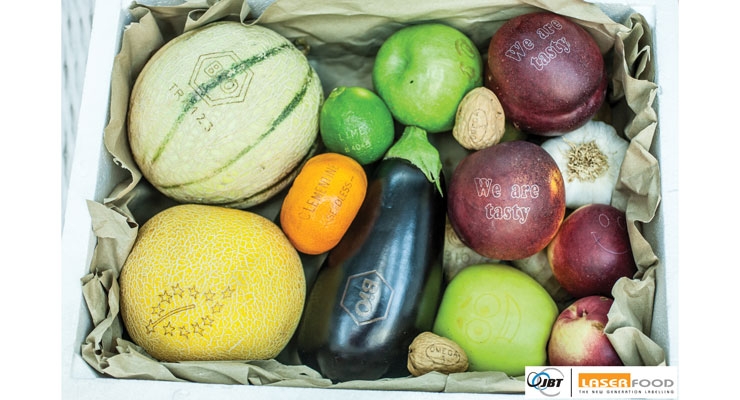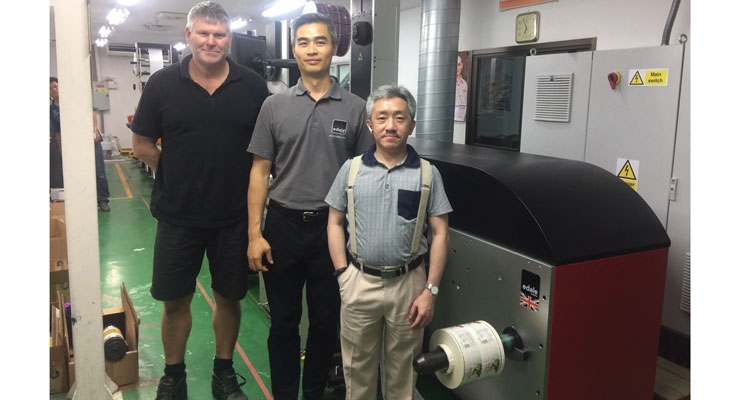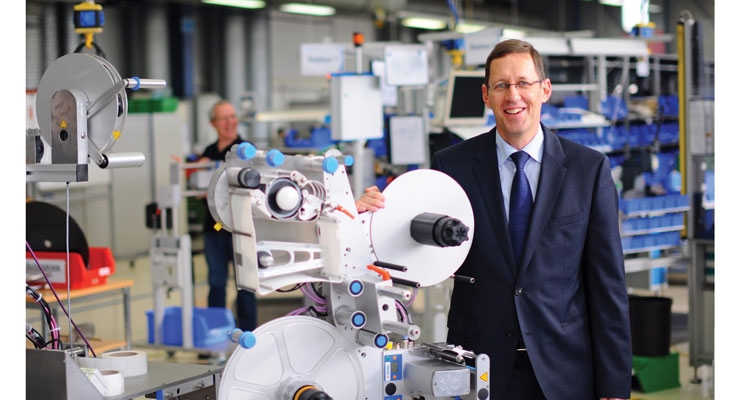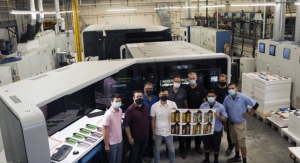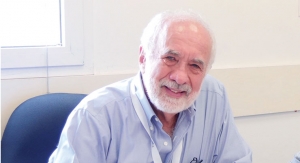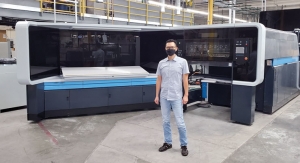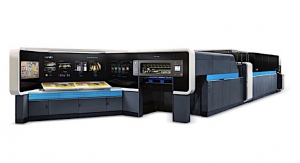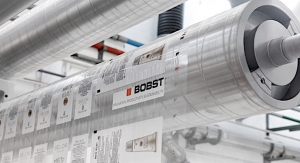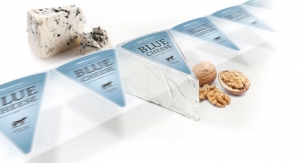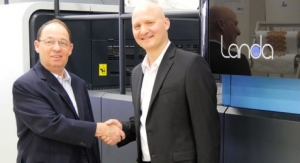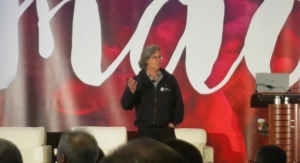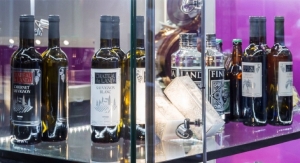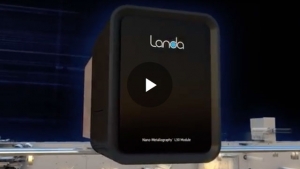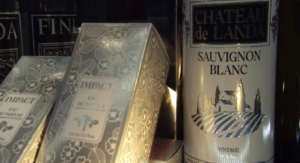John Penhallow03.13.17
The business press is generally loud in its praise and soft in its criticism. If a product fails to live up to the bleeding edge quantum-leap technological breakthrough promised by its PR people, the business press will say it “needs time to fulfill its potential.” So it is surprising that the well-respected German print magazine Deutscher Drucker chose to publish strong criticism of Benny Landa’s press as shown at drupa 2016. “As in 2012” wrote the German magazine, “Landa Digital Printing put on a dazzling show at drupa 2016. However the announcements that nanography would set new standards does not hold up to any serious consideration. At none of the booths at drupa did we see less convincing print samples than at Landa’s.” Kerpow!
The journalist reported seeing Landa personnel wearing “special protective clothing” and suggested that the inks used might be in some way toxic. The same journalist also reported registration problems and streak marks, and claimed that some print samples had been “doctored” to achieve the promised effect of high-contrast printing. Landa’s counter-attack was not long in coming: the many professional printers who visited the Landa booth found the print quality “stunning,” “breath-taking” and “brilliant,” Landa said. The business about special protective clothing was simply false, said the company, and produced in evidence the testimony of a respected consultancy, WTConsulting GmbH, who stated that “Landa inks comply with the provisions of the US FDA for indirect contact with foodstuffs and their safety can be equated with the safest water-based inks for the flexographic printing of food packaging.”
This controversy has not stopped the Netherlands-based EuroFlex from stepping forward as one of the first flexo printers in Europe to participate in beta-testing the latest Landa press. The model to be delivered to Euroflex is designed to run roll-to-sheet packaging but could also be adapted to produce labels. Bert Molenboer, EuroFlex’s sales manager reckons that “In five years, digital printing will have become commonplace in the packaging market.” The main disadvantage of current digital print technology is its slow speed, he says, but “With the arrival of this newcomer Landa, these restrictions will soon disappear. This is why EuroFlex decided in late December to participate as one of the first flexo printers in Europe with an introduction and testing of Landa.” Regarding the doubts surrounding Landa’s technology, Molenboer told your correspondent, “Much of the criticism around the Nanographic technique is mainly driven by uncertainty and fear.
A “new kid on the block,” Landa’s efforts to introduce a novel technique to a rather “crusted” industry is not much appreciated. “It is true that we still have a long way ahead and yet some challenges to overcome, but nevertheless we are very excited to be part of the development program with Landa.”
Recycling and brand owner awareness
Henkel is a global producer of industrial, commercial and consumer care products (it makes Schwarzkopf shampoo and hundreds of other products). In partnership with UPM Raflatac, Henkel has reduced its label liner waste to zero at one of its plants in Germany. Henkel generated more than 400 tons of siliconized glassine liner waste at this plant last year, and all of it was shipped to UPM’s paper mill at Plattling and there converted into graphic printing paper for books and magazines. 400 tons is a drop in the ocean but a drop which is music in the ears of the label industry and indeed of the German public, which is much concerned for the environment. It seems however from the latest studies by FINAT that the recycling message is falling on deaf ears, where many other brand owners are concerned. Almost half the end users surveyed for FINAT by consultants AWA said they were unaware of currently available recycling options for release liner, and over two-thirds of those surveyed are doing nothing to recycle their liner waste. The main reason given is because of the logistical complexity and cost of collection/ transport to a recycling facility. Says FINAT president Thomas Hagmaier, “This latest FINAT study underlines the need to educate the entire value chain about conducting economically viable spent liner recycling – an option which actually exists today.” This is certainly true, depending however on the distance between the brand owner’s site and the nearest liner recycling plant – and on-site managers’ willingness to see their employees spend time on something that does nothing for profitability. This is yet another indication, if such were needed, of the gulf between the high-minded ecological mantras from brand owners’ head offices and the hard-headed practicality ruling down the line at packing and labeling sites. This gap, and how to bridge it, will be among the subjects discussed at FINAT’s annual European Label Forum (ELF) to be held in June of this year in Berlin.
It’s an ill wind...
…that blows nobody any good. The world has watched anxiously the deteriorating relations between the US and Iran. The result is a further fall-off of US firms prospecting this market, which some thought so promising just a few months ago. No problems so far for Italian firms, and in particular for label press manufacturer Omet. “In the next five years, Iran will be one of the most promising markets for Omet,” stated Naim Yavuz, the company’s agent for Iran and Turkey. “We want to make our contribution to the growth and the spread of global standards in this area by helping the local institutions with the promotion of technical and educational training concerning label printing technologies and processes.” Long years of isolation have left Iran’s print industry with an urgent need to learn about modern technology, and Omet is also sponsoring scholarships in co-operation with the Iranian Chamber of Commerce. The Tarsus Group, organizer of Labelexpo, is also organizing seminars in Tehran.
Lasers for fruit
In Europe (and possibly in America), many fruits and vegetables carry a label showing the brand and sometimes the country of origin. This is good business for some label converters, but business that could go up in smoke – if laser marking catches on. That is what the Spanish company Laserfood hopes to achieve using this technology, which does away with the label and with any doubts consumers may have about adhesives and inks. The laser marking is said to have no effect on the taste and can of course be programmed to “print” any quantity large or small. Laserfood’s top-of-the-range unit was test-run marking 54,000 products per hour, the company says.
The Thais that bind
It is no secret that the European paper industry is in poor shape, with mills closing and companies downsizing. It was therefore something of a coup de théâtre when in 2013 Double A, a major paper company based in Thailand, bought a failing mill at Alizay, France, and set about producing office papers, with the promise of reopening the pulp production line later. Alas, the pulp project is postponed indefinitely and the line is working short time.
But all is not gloom on the Thai front. UK press manufacturer Edale has delivered another flexo press to a long-standing customer, EVA Enterprise Co. This converter has installed an 8-color, full UV FL3 – 350mm label press in its factory in Bangkok. EVA Enterprise produces over one million labels per day and already has several Edale machines (this UK press manufacturer has a reputation for selling custom-built presses in exotic places). The Thai economy grew by a respectable 3.2% in 2016 and the label market is reputed to be growing much faster than that, according to a recent report (“The paper label market in Thailand to 2021” produced by ReportLink.com).
Herma recovers well from ‘Brexit Effect’
Germany’s Herma is best known as a labelstock producer, but a substantial part of its business is in making and selling labeling systems. The labeling division of Herma had 2016 sales of 43 million euros ($45 million), up 3% on the previous year. The feat was remarkable in view of the importance, for Herma, of the British market, where local competitors were benefitting from the sharp fall in the pound. In 2016, Herma’s Labeling Division also opened a new office in the US, where according to divisional director Martin Kühl, it is now strongly placed to serve labeling needs and in particular those of the pharmaceutical industry, in all parts of North America.
Any Stan you can win, I can win better…
In the previous issue of L&NW, this column reported on the print business in Uzbekistan, where recent elections saw the new president winning 89% of the vote, an achievement that no Western leader has come near to beating. Not to be outdone, Gurbanguly Berdymukhamedov won the February 2017 election in neighboring Turkmenistan – taking a cool 98% of the popular vote, leaving seven other candidates to share the remaining 2%. Critics say that in the run-up to the vote he unleashed “a concerted campaign of harassment against civil-society activists and journalists” (a technique which some say proved effective elsewhere). L&NW readers who manufacture label converting equipment can probably put on hold any sales drive in Turkmenistan: its gas-dependent economy is in the doldrums along with staple goods. So, it seems, is business morality: Transparency International’s corruption perception index ranks Turkmenistan 154th out of 176, worse than Tajikistan, Kyrgyzstan and other exotic places you may prefer not to visit just yet.
The journalist reported seeing Landa personnel wearing “special protective clothing” and suggested that the inks used might be in some way toxic. The same journalist also reported registration problems and streak marks, and claimed that some print samples had been “doctored” to achieve the promised effect of high-contrast printing. Landa’s counter-attack was not long in coming: the many professional printers who visited the Landa booth found the print quality “stunning,” “breath-taking” and “brilliant,” Landa said. The business about special protective clothing was simply false, said the company, and produced in evidence the testimony of a respected consultancy, WTConsulting GmbH, who stated that “Landa inks comply with the provisions of the US FDA for indirect contact with foodstuffs and their safety can be equated with the safest water-based inks for the flexographic printing of food packaging.”
This controversy has not stopped the Netherlands-based EuroFlex from stepping forward as one of the first flexo printers in Europe to participate in beta-testing the latest Landa press. The model to be delivered to Euroflex is designed to run roll-to-sheet packaging but could also be adapted to produce labels. Bert Molenboer, EuroFlex’s sales manager reckons that “In five years, digital printing will have become commonplace in the packaging market.” The main disadvantage of current digital print technology is its slow speed, he says, but “With the arrival of this newcomer Landa, these restrictions will soon disappear. This is why EuroFlex decided in late December to participate as one of the first flexo printers in Europe with an introduction and testing of Landa.” Regarding the doubts surrounding Landa’s technology, Molenboer told your correspondent, “Much of the criticism around the Nanographic technique is mainly driven by uncertainty and fear.
A “new kid on the block,” Landa’s efforts to introduce a novel technique to a rather “crusted” industry is not much appreciated. “It is true that we still have a long way ahead and yet some challenges to overcome, but nevertheless we are very excited to be part of the development program with Landa.”
Recycling and brand owner awareness
Henkel is a global producer of industrial, commercial and consumer care products (it makes Schwarzkopf shampoo and hundreds of other products). In partnership with UPM Raflatac, Henkel has reduced its label liner waste to zero at one of its plants in Germany. Henkel generated more than 400 tons of siliconized glassine liner waste at this plant last year, and all of it was shipped to UPM’s paper mill at Plattling and there converted into graphic printing paper for books and magazines. 400 tons is a drop in the ocean but a drop which is music in the ears of the label industry and indeed of the German public, which is much concerned for the environment. It seems however from the latest studies by FINAT that the recycling message is falling on deaf ears, where many other brand owners are concerned. Almost half the end users surveyed for FINAT by consultants AWA said they were unaware of currently available recycling options for release liner, and over two-thirds of those surveyed are doing nothing to recycle their liner waste. The main reason given is because of the logistical complexity and cost of collection/ transport to a recycling facility. Says FINAT president Thomas Hagmaier, “This latest FINAT study underlines the need to educate the entire value chain about conducting economically viable spent liner recycling – an option which actually exists today.” This is certainly true, depending however on the distance between the brand owner’s site and the nearest liner recycling plant – and on-site managers’ willingness to see their employees spend time on something that does nothing for profitability. This is yet another indication, if such were needed, of the gulf between the high-minded ecological mantras from brand owners’ head offices and the hard-headed practicality ruling down the line at packing and labeling sites. This gap, and how to bridge it, will be among the subjects discussed at FINAT’s annual European Label Forum (ELF) to be held in June of this year in Berlin.
It’s an ill wind...
…that blows nobody any good. The world has watched anxiously the deteriorating relations between the US and Iran. The result is a further fall-off of US firms prospecting this market, which some thought so promising just a few months ago. No problems so far for Italian firms, and in particular for label press manufacturer Omet. “In the next five years, Iran will be one of the most promising markets for Omet,” stated Naim Yavuz, the company’s agent for Iran and Turkey. “We want to make our contribution to the growth and the spread of global standards in this area by helping the local institutions with the promotion of technical and educational training concerning label printing technologies and processes.” Long years of isolation have left Iran’s print industry with an urgent need to learn about modern technology, and Omet is also sponsoring scholarships in co-operation with the Iranian Chamber of Commerce. The Tarsus Group, organizer of Labelexpo, is also organizing seminars in Tehran.
Lasers for fruit
In Europe (and possibly in America), many fruits and vegetables carry a label showing the brand and sometimes the country of origin. This is good business for some label converters, but business that could go up in smoke – if laser marking catches on. That is what the Spanish company Laserfood hopes to achieve using this technology, which does away with the label and with any doubts consumers may have about adhesives and inks. The laser marking is said to have no effect on the taste and can of course be programmed to “print” any quantity large or small. Laserfood’s top-of-the-range unit was test-run marking 54,000 products per hour, the company says.
The Thais that bind
It is no secret that the European paper industry is in poor shape, with mills closing and companies downsizing. It was therefore something of a coup de théâtre when in 2013 Double A, a major paper company based in Thailand, bought a failing mill at Alizay, France, and set about producing office papers, with the promise of reopening the pulp production line later. Alas, the pulp project is postponed indefinitely and the line is working short time.
But all is not gloom on the Thai front. UK press manufacturer Edale has delivered another flexo press to a long-standing customer, EVA Enterprise Co. This converter has installed an 8-color, full UV FL3 – 350mm label press in its factory in Bangkok. EVA Enterprise produces over one million labels per day and already has several Edale machines (this UK press manufacturer has a reputation for selling custom-built presses in exotic places). The Thai economy grew by a respectable 3.2% in 2016 and the label market is reputed to be growing much faster than that, according to a recent report (“The paper label market in Thailand to 2021” produced by ReportLink.com).
Herma recovers well from ‘Brexit Effect’
Germany’s Herma is best known as a labelstock producer, but a substantial part of its business is in making and selling labeling systems. The labeling division of Herma had 2016 sales of 43 million euros ($45 million), up 3% on the previous year. The feat was remarkable in view of the importance, for Herma, of the British market, where local competitors were benefitting from the sharp fall in the pound. In 2016, Herma’s Labeling Division also opened a new office in the US, where according to divisional director Martin Kühl, it is now strongly placed to serve labeling needs and in particular those of the pharmaceutical industry, in all parts of North America.
Any Stan you can win, I can win better…
In the previous issue of L&NW, this column reported on the print business in Uzbekistan, where recent elections saw the new president winning 89% of the vote, an achievement that no Western leader has come near to beating. Not to be outdone, Gurbanguly Berdymukhamedov won the February 2017 election in neighboring Turkmenistan – taking a cool 98% of the popular vote, leaving seven other candidates to share the remaining 2%. Critics say that in the run-up to the vote he unleashed “a concerted campaign of harassment against civil-society activists and journalists” (a technique which some say proved effective elsewhere). L&NW readers who manufacture label converting equipment can probably put on hold any sales drive in Turkmenistan: its gas-dependent economy is in the doldrums along with staple goods. So, it seems, is business morality: Transparency International’s corruption perception index ranks Turkmenistan 154th out of 176, worse than Tajikistan, Kyrgyzstan and other exotic places you may prefer not to visit just yet.

